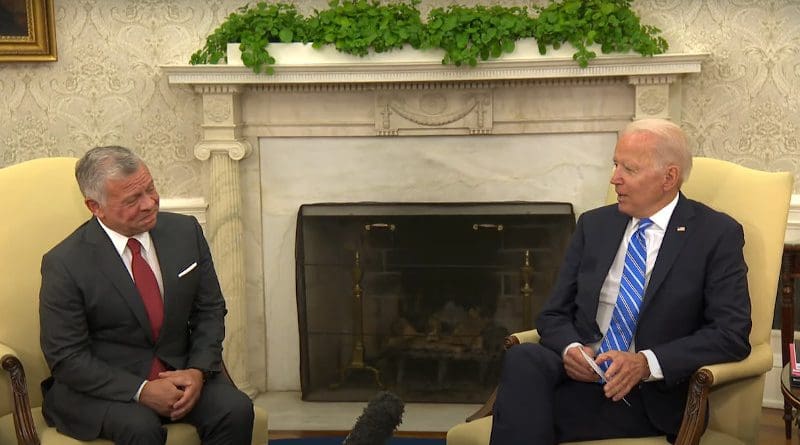The Challenges Staring Iraq’s Al-Kadhimi In The Face – OpEd
By Arab News
By Osama Al-Sharif*
Beyond the traditional photo-ops and the carefully chosen remarks praising the strategic relationship between the US and Iraq, it is what President Joe Biden and Prime Minister Mustafa Al-Kadhimi talked about behind closed doors at the White House on Monday that will really matter. At stake is the political survival of Al-Kadhimi, more than a year after he assumed office and three months before Iraq holds a crucial legislative election that promises to change the trajectory of the country’s fledgling and beleaguered democracy.
The strategic dialogue between Iraq and the US has been taking place while Washington and its Western allies have been meeting in Vienna to try to salvage the Iran nuclear deal. Tehran is using its proxy militias in Iraq to put pressure on the Americans. Al-Kadhimi wants to take Iraq out of such a showdown. But, while he succeeded in committing Biden to a timetable for changing the status of the US troops in Iraq from combat to support, he will have a tough time convincing the Iranians and their proxies to stop meddling in Baghdad’s politics.
Al-Kadhimi is walking a tightrope as he tries to preserve Iraq’s military and economic bond with the US, while hoping to appease the pro-Iran political players who want American troops to leave the country 18 years after what is now perceived to be an ill-chosen decision by President George W. Bush and his neoconservative aides to invade the country and change the regime.
Before he left Baghdad, Al-Kadhimi declared that Iraq no longer needed US combat troops or coalition military bases and that all it needed was training, support and intelligence sharing to confront Daesh. In recent weeks, pro-Iranian militias in Iraq have intensified their drone and missile attacks on bases where US troops are located, as well as on the US Embassy in Baghdad and its consulate in Irbil.
In response, the US carried out surgical air strikes against the key positions of such militias. Now, Al-Kadhimi, in an attempt to placate his political foes and Tehran, wants Biden to commit to a timetable for US military withdrawal. But he is also aware that a complete US withdrawal at this sensitive time could resemble the Afghanistan scenario. The question is who will benefit from an American military withdrawal from Iraq?
There are a couple of thousand US troops remaining in Iraq. Their main mission is to help the Iraqi army — and, by extension, the notorious Popular Mobilization Units — deal with the remnants of Daesh by providing air cover. Since their defeat in 2017, Daesh fighters have been regrouping along the Iraqi-Syrian border. They have launched deadly attacks against Iraqi army personnel and civilian targets, including a suicide attack on Sadr City last week that killed more than 35 people a day before Eid Al-Adha.
It is for Biden and his top aides to come up with a clear strategy concerning America’s objectives in Iraq now that the war authorization act has been repealed. Republicans were quick to label Biden’s decision to limit the US presence in Iraq as a win for Iran. Meanwhile, America’s Arab allies have been trying to woo Baghdad into rejoining the Arab fold — a vague term that is difficult to explain as the region undergoes geopolitical upsets, many of which have to do with increasing Iranian interference.
Jordan and Egypt have joined an alliance with Iraq under what Al-Kadhimi has called a “new Levant,” which seeks to create an economic bloc that may one day include Syria. King Abdullah, during his recent visit to Washington, urged Biden to back Al-Kadhimi’s efforts to steer away from Iran.
While Al-Kadhimi got a commitment from Biden on the US military status, he still has to deal with his Kurdish partners in the autonomous Kurdistan region, where officials are opposing the American withdrawal. They believe the Iraqi army will not be able to deal with Daesh while the country remains politically unstable.
Although Al-Kadhimi got Biden on board, there are no guarantees he can survive the October polls. The populist Shiite leader Muqtada Al-Sadr announced last week that he will not be contesting the elections or backing any candidate. How that will affect Al-Kadhimi’s chances remains to be seen. Meanwhile, Iraq continues to suffer from a myriad of challenges, including the killing of anti-Iran reformers and activists, power outages and water scarcity, in addition to massive unemployment, official corruption and the coronavirus pandemic.
The road to Iraq’s recovery is long and, while the upcoming elections could be a watershed moment, there are still questions regarding Iranian influence on the political process and the failing ethno-sectarian system, which appears to dominate the coalitions and lists running in the Oct. 10 vote. Al-Kadhimi may have secured a symbolic win in Washington, but the hurdles that lie ahead will prove difficult to negotiate.
- Osama Al-Sharif is a journalist and political commentator based in Amman. Twitter: @plato010

